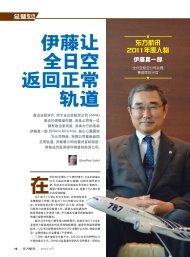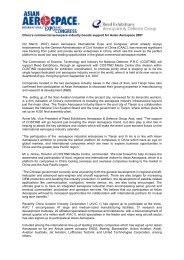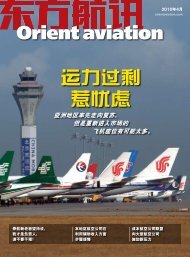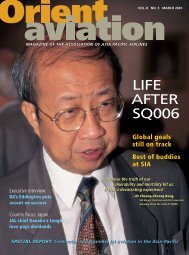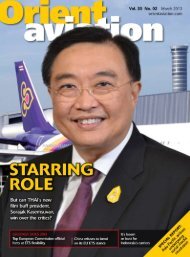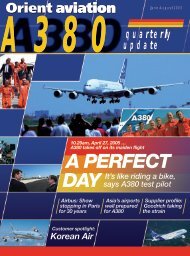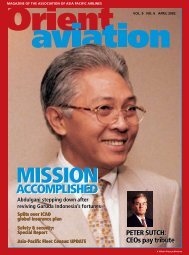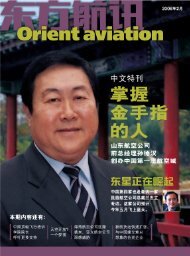Japan Airlines - Orient Aviation
Japan Airlines - Orient Aviation
Japan Airlines - Orient Aviation
- No tags were found...
Create successful ePaper yourself
Turn your PDF publications into a flip-book with our unique Google optimized e-Paper software.
ENVIRONMENTWanted: a global approachAsian airlines are pulling out all stops to make their operations environmentallyfriendly. But what they want most is international standardization when it comesto meeting the challenge to aviation presented by ‘green’ issuesBy Tom BallantyneThere needs to be a harmonizedglobal approach to aviationenvironmental issues and“consistency of application”of regulations rather thanunilateral regional initiatives, accordingto the director general of the Associationof Asia Pacific <strong>Airlines</strong> (AAPA), AndrewHerdman.Speaking at an AAPA forum on theenvironment held in Brunei late last year, hesaid harmonization was essential to avoidcompetitive distortions. “The AAPA willremain focused on ensuring that the viewsof the Asia-Pacific are both heard and carryproper weight in an international context,”he added.The forum urged governments to workcollaboratively within the framework of theInternational Civil <strong>Aviation</strong> Organization(ICAO) in seeking to reconcile the interestsof citizens and countries at different stagesof development as they moved towards trulysustainable global development.It also asked governments to recognizethe ineffectiveness of green taxes in changingbehaviour. Voluntary initiatives and marketbasedmeasures are more appropriate toolsfor tackling environmental challenges,delegates decided.The Brunei gathering came as theaviation environment debate continuedto heat up, particularly in Europe. Thereis mounting disquiet within the industryover European Commission (EC) plansto introduce an emissions trading schemespecifically targeted at airlines. It will applyto all airlines flying within Europe and toand from Europe. In January, Britain’senvironment minister, Ian Pearson, raisedthe temperature further by accusing airlinesof trying to dodge responsibility for theirimpact on climate change.The Inter national Air Transpor tAssociation (IATA) agreed emissionstrading is the best way for Europe to meetits emissions targets, but only with “the righttrading formula and if airlines take part in amulti-industry emissions market”.IATA’s chief economist, Brian Pearce,speaking during a series of briefings tointernational media in Geneva in December,criticised the European Parliament’s proposalfor airlines to have a “closed, aviation-only”emissions trading scheme. He argued thiswould not be effective if the objective was anoverall reduction in Europe’s global warming‘[<strong>Aviation</strong>] must minimize[its] impact on the naturalenvironment [it] inhabits’Andrew HerdmanDirector GeneralAAPAgas emissions.Pearce said if governments want to cutemissions rather than raise taxes that “makethe polluter pay”, they should approve asystem in which airlines can buy allowancesfrom industries that emit more CO 2 and havea greater potential to reduce production ofthis greenhouse gas while incurring a lowerunit cost of doing so.The formula would involve eachemissions-producing sector – or individualbusiness – having a capped allowance intonnes of CO 2 . If it needs to emit more,it must purchase “permits to emit” fromcompanies or sectors that have earned themby cutting emissions, or which have not usedall their capped allowance.According to Pearce, aviation’s problemis that airlines mostly own modern fleets inwhich most of the fuel efficiencies that canbe made have been, so further advances canonly be small and high-cost.He contrasts this with other sectors, suchas heavy industry, power generation andresidential energy use, where the technologythat can reduce emissions are relatively cheapper tonne of CO 2 cut. Not only is this cheaperto do, but since these sectors emit far morethan the airline industry does, the potentialbenefits are greater.“<strong>Aviation</strong> plays an important role inmodern economic and social development.At the same time we must minimize ourimpact on the natural environment weinhabit”, said Herdman.“<strong>Aviation</strong> faces a number of distinctissues relating to the environment. Noise,particularly around airports, has long beena contentious subject. Manufacturers havemade significant progress in reducing thenoise footprint of modern aircraft, whichare noticeably quieter in operation.“Local air quality is another aspectof being a good corporate citizen, whereairlines continue to work closely withairport operators to manage local emissions,including emissions from ground transportsystems and services, as well as aircraftemissions on the ground.”Herdman said the threat representedby global warming has some bearing onaviation. “It is worth noting that aviationgenerates only 2% of total CO 2 emissions,whilst contributing directly and indirectlyto 8% of global economic activity.Nevertheless, aviation is committed tocontinuous improvements in fuel efficiency,through the use of newer designs and moreefficient operating procedures,” he said.24 ORIENT AVIATION FEBRUARY 2007


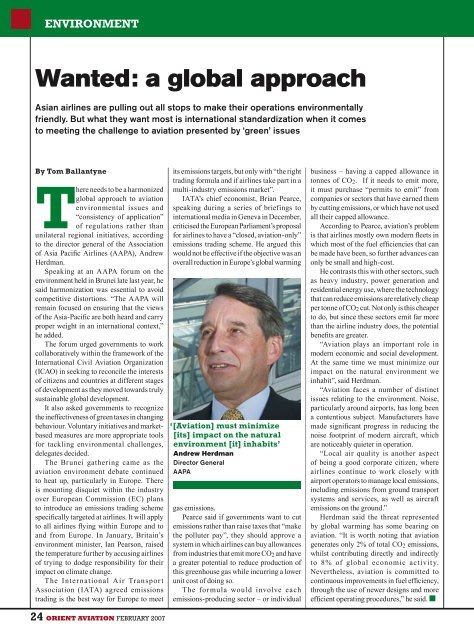

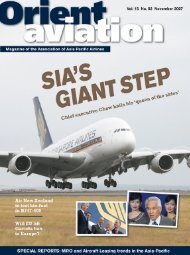
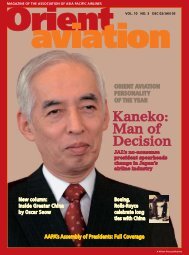
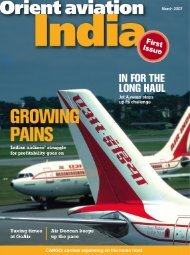
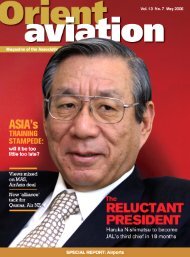
![OAMag-V7N4-Cover [Converted] - Orient Aviation](https://img.yumpu.com/48598575/1/190x255/oamag-v7n4-cover-converted-orient-aviation.jpg?quality=85)
